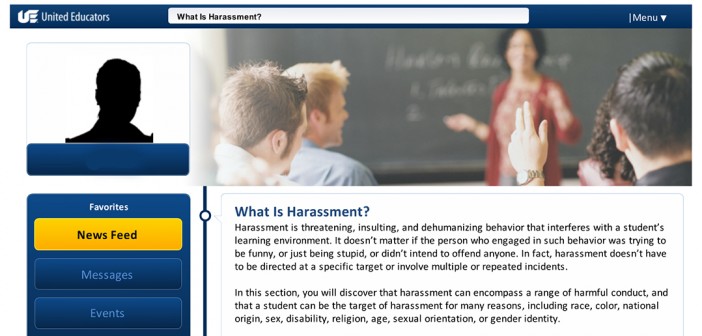This story is the second in a series examining the actions Lehigh University is taking to address campus climate as a result of the voluntary resolution agreement with the OCR. Read the first in the series.
The review of Lehigh’s harassment policy, a document aimed at defining harassment and strategies to address incidents at Lehigh, began in the spring of 2014. Although minor changes have been made to the document over the years to comply with laws, major changes have not been made since its creation in 2002.
The revision process started with getting best practices from outside counsel, who previously worked for the Office of Civil Rights. Over the summer, the harassment policy was revised several times by benchmarking against other policies and incorporating the requirements of the OCR agreement.
The committee
This fall, a committee of 20 faculty, staff and undergraduate and graduate students was compiled to review and discuss the new harassment policy draft.
Heather Hosfeld, the deputy general counsel in the Office of the General Counsel, has taken the lead in organizing the revision of Lehigh’s harassment policy.
“It was really a matter of making sure it was readable, it was concise, it had all of the elements,” she said.
Hosfeld is on the Council for Equity and Community and looked to that committee for finding people to help review the policy. Members in a subcommittee of the council that deals with policy review and governance were also asked to review the policy.
Hosfeld reached out to other faculty and staff that had shown interest in these issues and asked Sharon Basso, the associate vice provost and dean of students, about students who would be a good fit for the committee.
Chris Mulvihill, assistant dean in the Office of Student Conduct, was a member of the harassment policy review committee. He said it made sense for him to be on the committee because his office handles administering student violations of the harassment policy.
“I have to enforce it, I might as well help write the policy,” Mulvihill said.
He said the revision process included looking at the old policy, at the changes mandated by OCR and at changes happening in laws.
“(The Office of the General Counsel) presented a document with the changes that they thought would be appropriate,” he said.
Mulvihill said the process was very interactive and the committee talked through the good and bad of each change being considered. In particular, he said, the specifics about language and meaning behind wording of the policy were discussed.
“The language we’re using seems to convey the concept of inclusiveness, which the harassment policy is really all about,” he said.
After a few rounds of edits with the committee, the harassment policy was run by campus groups such as the Council of Student Presidents, Student Senate, Graduate Student Senate, the Employee Relations Advisory Committee and the Council for Equity and Community.
Most recently, a presentation of the new policy was given at a faculty meeting Feb. 23. Another presentation is scheduled for March 23. The presentation included the significant changes to the policy, how it compares to the 2002 version and solicited comments and feedback from faculty.
The revised policy was submitted to OCR on Feb. 27 and is currently being reviewed. OCR will respond with any comments or concerns it has with the policy and Lehigh will revise again, bring it to faculty again and ultimately to the board of trustees for it to be adopted by the university.
Once Lehigh receives feedback from OCR, it has 45 days to be begin to implement, finalize and get the policy approved.
“I think we’re ready to go, so we’re hoping to get it moving as quickly as we can,” Hosfeld said.
The next step after finalizing the policy, according to Hosfeld, is continuing to educate and train the Lehigh community on the changes made to the policy.
“I know it’s not a fun document to read, but the more people come forward, we can explain what’s in here and talk about the process,” Hosfeld said.
Major changes
The major changes include combining the harassment and non-discrimination/affirmative action policies, adding a table of contents and adding a section that deals with the Council for Equity and Community being a standing committee of the university. Statements have been added to the policy about the standard of evidence required by law.
Karen Salvemini, Lehigh’s newly hired equal opportunity compliance coordinator, has been involved in the revision of the harassment policy and the harassment training since they relate so closely to her new position.
“We try to strike that balance between putting everything that’s legally required in it but also putting it into a form and wording that people can understand,” she said.
The policy specifies the individuals who have an obligation to report instances of discrimination or harassment to Salvemini. These individuals are those who come in contact with incidents relating to students or reported by a student. Everyone else is strongly encouraged to still report instances of harassment and discrimination.
The policy has simplified the reporting process, part of the reason why Salvemini was hired as the coordinator.
Specific timelines have been added to the policy, requiring Lehigh to complete an investigation within 60 days, whereas the policy previously just said “promptly.”
Lastly, a list of resources was added to continue to help the reporting structure. This will help those dealing with harassment and discrimination issues and deciding whether they should report it to the police, Salvemini or use an online reporting form.
Feedback
The revised policy was posted on the Council for Equity and Community blog in order to solicit comments. It was left open and received a lot of feedback from the Lehigh community. The blog was open for comments and feedback from Feb. 20 to Feb. 25. Comments were posted publicly and also privately by users who didn’t want their feedback shared.
“We’re really taking all of it in and trying to make sure we’re addressing everyone’s concerns,” Hosfeld said.
While some phrasing is necessary due to laws, the Office of the General Counsel and the harassment policy review committee are working to make the document something people can follow and understand.
“Opening up to a broader audience and community after we’ve developed this document gives us an opportunity to have a lot of different lenses look at it,” Mulvihill said.
Harassment training
According to Lehigh’s voluntary resolution agreement with OCR, “by March 5, 2015, and annually thereafter, the university will provide training on the Racial Harassment Policy to all faculty, administrators and any other University personnel charged with supervising students.”
The university provided an online harassment training program, which was distributed to students via email. The deadline for completing the training was March 1. As of March 13, however, only 1,494 faculty and staff and 995 students had completed the online harassment training, according to Salvemini. The training is still available to be completed online.
“This year, while it was required, and while we have emphasized the fact that everyone was expected to do it, there were no set penalties in place,” Salvemini said.
Lehigh has always offered online harassment training but it has never previously been required.
“We wanted to establish a baseline for all faculty, all staff, all students to have a certain level of training,” Hosfeld said.
In-person trainings have also been held, targeted at certain groups and areas. All 23 athletic teams have been trained in the harassment policy.
“We’re going to have to assess how well we did with those numbers and look at other options going forward whether we have to start to put some kind of mechanism in there to make sure everybody does it,” Hosfeld said.
Non-discrimination statement
A non-discrimination statement is also required by various civil rights laws and Lehigh has always had one. Although it was listed in many places, it was desired for it to be published more broadly, Hosfeld said.
Since so many other revisions were being made to Lehigh documents relating to harassment and discrimination, it made sense to revise this statement, as well, Salvemini said.
The statement has become more standardized and lists Salvemini as the main point of contact, along with a backup contact. The statement has been sent in an email and will be in almost all academic buildings and residence halls.
“At this point we’re just moving forward with implementing the OCR agreement and making sure we’re getting the word out about the (coordinator) position,” Salvemini said.






Comment policy
Comments posted to The Brown and White website are reviewed by a moderator before being approved. Incendiary speech or harassing language, including comments targeted at individuals, may be deemed unacceptable and not published. Spam and other soliciting will also be declined.
The Brown and White also reserves the right to not publish entirely anonymous comments.
1 Comment
I’m all for reducing harassment, but I find it silly to make it mandatory for students. While helpful, its silly to force students to take action. Why not let students vote on whether they think it should be required or not, and get their opinion on it?